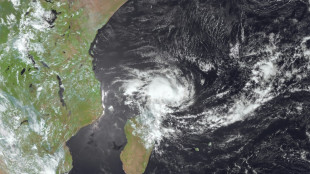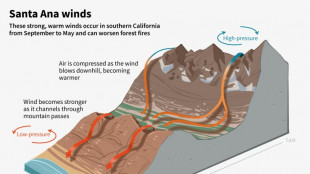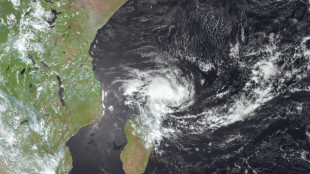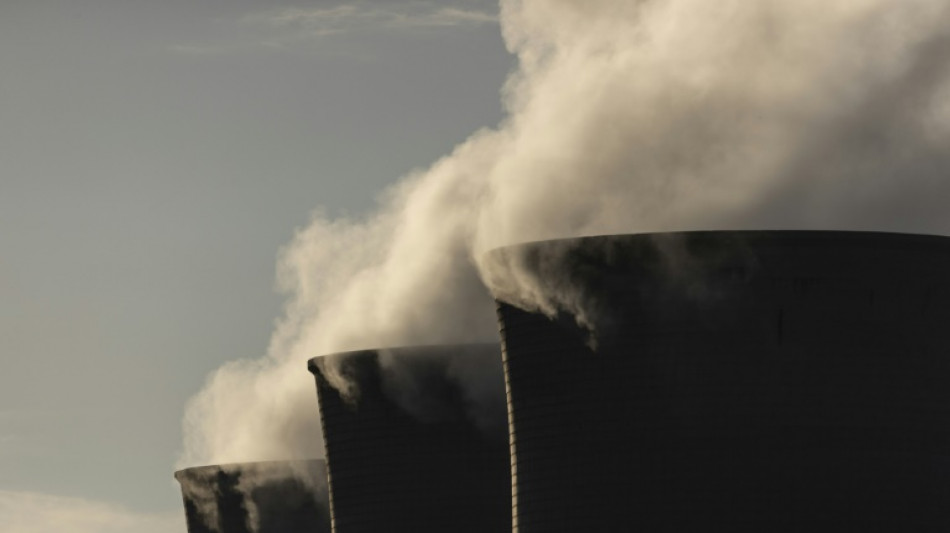
-
 Easterby sticks by Six Nations-winning veterans in first Irish squad
Easterby sticks by Six Nations-winning veterans in first Irish squad
-
Scotland recall Jonny Gray for Six Nations

-
 UN rights chief says transitional justice 'crucial' in Syria
UN rights chief says transitional justice 'crucial' in Syria
-
US consumer inflation rises to 2.9 percent in December

-
 Germany's Thiaw to miss Juve and Champions League clashes with hamstring injury: AC Milan
Germany's Thiaw to miss Juve and Champions League clashes with hamstring injury: AC Milan
-
France name Jegou, Auradou in Six Nations squad

-
 Lategan back on top as Roma hands Ford first Dakar stage win in 10 years
Lategan back on top as Roma hands Ford first Dakar stage win in 10 years
-
Mozambique's new president vows 'unity' as sworn in amid deadly protests

-
 Russia PM meets Vietnam president, seeking deeper ties
Russia PM meets Vietnam president, seeking deeper ties
-
'New blood is coming': Mensik dumps Ruud out of Australian Open

-
 Syria sex abuse survivors need aid, says Nobel winner Mukwege
Syria sex abuse survivors need aid, says Nobel winner Mukwege
-
Hammers boss Potter ready to make do and mend amid striker shortage

-
 Zverev cruises into Australian Open third round
Zverev cruises into Australian Open third round
-
Ancelotti demands Real Madrid response after Clasico drubbing

-
 Serve better! Gauff outlines must-do for next Melbourne clash
Serve better! Gauff outlines must-do for next Melbourne clash
-
Benn and Eubank Jr boxing bout set to finally take place in London in April

-
 German economy shrinks again amid political crisis
German economy shrinks again amid political crisis
-
Spain hosted record 94 mn foreign tourists in 2024

-
 Thai PM says nearly fell for foreign leader phone scam
Thai PM says nearly fell for foreign leader phone scam
-
European stocks climb as inflation takes centre stage

-
 Teenager Mensik sends sixth seed Ruud crashing out of Australian Open
Teenager Mensik sends sixth seed Ruud crashing out of Australian Open
-
Russia strikes Ukraine energy sites in 'massive' barrage

-
 Dyche says Everton exit came at 'the right time'
Dyche says Everton exit came at 'the right time'
-
Australia mulls 'all options' after citizen reported killed by Russian forces

-
 Djokovic creates slice of history as Zheng stunned in Melbourne
Djokovic creates slice of history as Zheng stunned in Melbourne
-
Gauff overcomes wobble to roll into Australian Open last 32

-
 BP nears deals for oil fields, curbs on gas flaring in Iraq
BP nears deals for oil fields, curbs on gas flaring in Iraq
-
Mozambique inaugurates new president after deadly post-election unrest

-
 Syrian activists work to avoid return to dictatorship
Syrian activists work to avoid return to dictatorship
-
Holy dips at India's giant Hindu festival come with challenge

-
 Thousands to be evacuated after Mount Ibu eruption
Thousands to be evacuated after Mount Ibu eruption
-
'Thrilled': Record-setting Djokovic trumps Federer on way to round three

-
 Alcaraz, Djokovic tip 'incredible' teenager Fonseca for the top
Alcaraz, Djokovic tip 'incredible' teenager Fonseca for the top
-
Cocaine use nearly doubles in France: study

-
 Beijing 'firmly opposes' US ban on smart cars with Chinese tech
Beijing 'firmly opposes' US ban on smart cars with Chinese tech
-
Equities mixed as US inflation, China data loom

-
 UK inflation dips, easing some pressure on government
UK inflation dips, easing some pressure on government
-
India's triple naval launch shows 'self-reliance': Modi

-
 Wallabies great Hooper set for comeback aged 33 with Japan move
Wallabies great Hooper set for comeback aged 33 with Japan move
-
German bourse banks on Trump-fuelled crypto boom

-
 Record 36.8 million tourists visited Japan in 2024
Record 36.8 million tourists visited Japan in 2024
-
Trump's policies won't push up inflation, economic advisor says

-
 German far-right AfD takes aim at Bauhaus movement
German far-right AfD takes aim at Bauhaus movement
-
Djokovic makes slice of history as Zheng stunned in Melbourne

-
 The journalists behind Sarkozy's Libya corruption woes
The journalists behind Sarkozy's Libya corruption woes
-
SpaceX set for seventh test of Starship megarocket
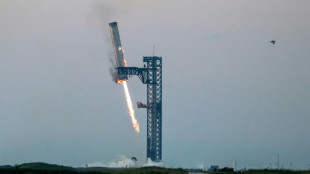
-
 Record-setting Djokovic trumps Federer on way to Melbourne third round
Record-setting Djokovic trumps Federer on way to Melbourne third round
-
Private US, Japanese lunar landers launch on single rocket

-
 Spanish youth ditch dating apps for 'real life' love
Spanish youth ditch dating apps for 'real life' love
-
Pakistan plot spin blitz as West Indies return after 19 years


'Unabated': a word to split the world at COP28
The outcome of the most important climate negotiations in years could rest on the ambiguity surrounding one linchpin term, according to experts: "unabated fossil fuels".
With the world experiencing its hottest year on record and devastating heat, wildfires and flooding battering communities across the planet, negotiators at the COP28 talks must hammer out a response to a UN assessment that countries are far from meeting their climate targets.
Ditching coal, oil and gas for cleaner energies is essential if the world is to meet its goal of limiting global warming and avoiding the most catastrophic climate impacts.
Among the menu of hotly contested options negotiators have picked over this week include an agreement to accelerate "efforts towards phasing out unabated fossil fuels" and to cut their use to reach net-zero by around mid-century.
There is also an option of a "rapid phase out of unabated coal power" this decade.
The problem, experts say, is in specifying what this actually means.
"Terms like unabated, they have no clear meaning at the moment," Lisa Fischer, an analyst with the think tank E3G said at a briefing this week.
- Tech fix? -
Abated is generally understood as capturing emissions before they go into the atmosphere.
A footnote in the most recent benchmark report of the UN IPCC scientific advisory body said unabated fossil fuels are those "without interventions that substantially reduce" greenhouse gas emissions.
That can include capturing at least 90 percent of carbon dioxide from power plants, or up to 80 percent of the methane that leaks during energy production and transport, the report suggested.
Discussions of abatement largely centre around Carbon Capture and Storage (CCS) technologies that trap emissions from power stations or industrial facilities.
This is touted by the fossil fuel industry and major producing countries, including oil-rich COP28 host the United Arab Emirates.
COP28 president Sultan Al Jaber, who also leads the UAE's national oil company ADNOC, has said climate diplomacy should focus on phasing out emissions -- not necessarily the fossil fuels themselves.
His stance clashes with nations seeking a commitment to phasing out oil, gas and coal altogether, such as Pacific island nations that could be swallowed by rising seas.
In the near-term, the IPCC says greenhouse gas emissions need to be slashed almost in half this decade to meet the Paris deal's more ambitious -- and safer -- limit of 1.5C warming.
That means rapidly replacing fossil fuels with renewables, say experts, noting that CCS has little role to play in this crucial decade.
In 2022, 35 commercial-scale facilities worldwide applying CCS isolated a total of 45 million tonnes of CO2, according to the International Energy Agency.
By comparison, Jaber has said the world needs to cut emissions amounting to 22 billion tonnes of greenhouse gases "in the next seven years".
- 'Distraction tactic' -
Even in the longer term, scientists project there will be only limited use of abatement technology, focused in sectors that are particularly hard to decarbonise, like cement.
In a statement released before the climate talks, the High Ambition Coalition of countries -- including France, Kenya and Colombia -- said abatement technology has a "minimal" role to play in decarbonising energy.
"We cannot use it to green-light fossil fuel expansion," they said.
There are also concerns that the technology will not stop enough emissions from reaching the atmosphere.
An analysis by the group Climate Analytics this week found that an overreliance on large-scale CCS -- and an underperformance of the technology -- could lead to 86 billion tonnes of excess greenhouse gas emissions between 2020 and 2050.
Fischer said the focus on CCS was "very much a distraction tactic," adding it is unlikely ever to be useful in some significant areas of fossil fuel consumption, particularly oil.
"You can't really fit a little carbon capture device onto every exhaust pipe of a car," said Fischer.
CCS is not new. The fossil fuel industry has been using it since the 1970s, not to prevent CO2 from leaching into the atmosphere but to inject the gas into oil fields to extract more crude.
Historically, bolting CCS facilities onto coal- and gas-fired power plants and then storing the CO2 to reduce emissions has proven technically feasible but uneconomical.
A new report from Oxford University's Smith School of Enterprise and the Environment found that heavy dependence on CCS to reach net zero targets around 2050 would cost at least $30 trillion more than using mainly renewables, efficiency and electrification.
"Using CCS to facilitate business-as-usual fossil fuel use, even if feasible, would be highly economically damaging," it said.
H.E.Young--AMWN

